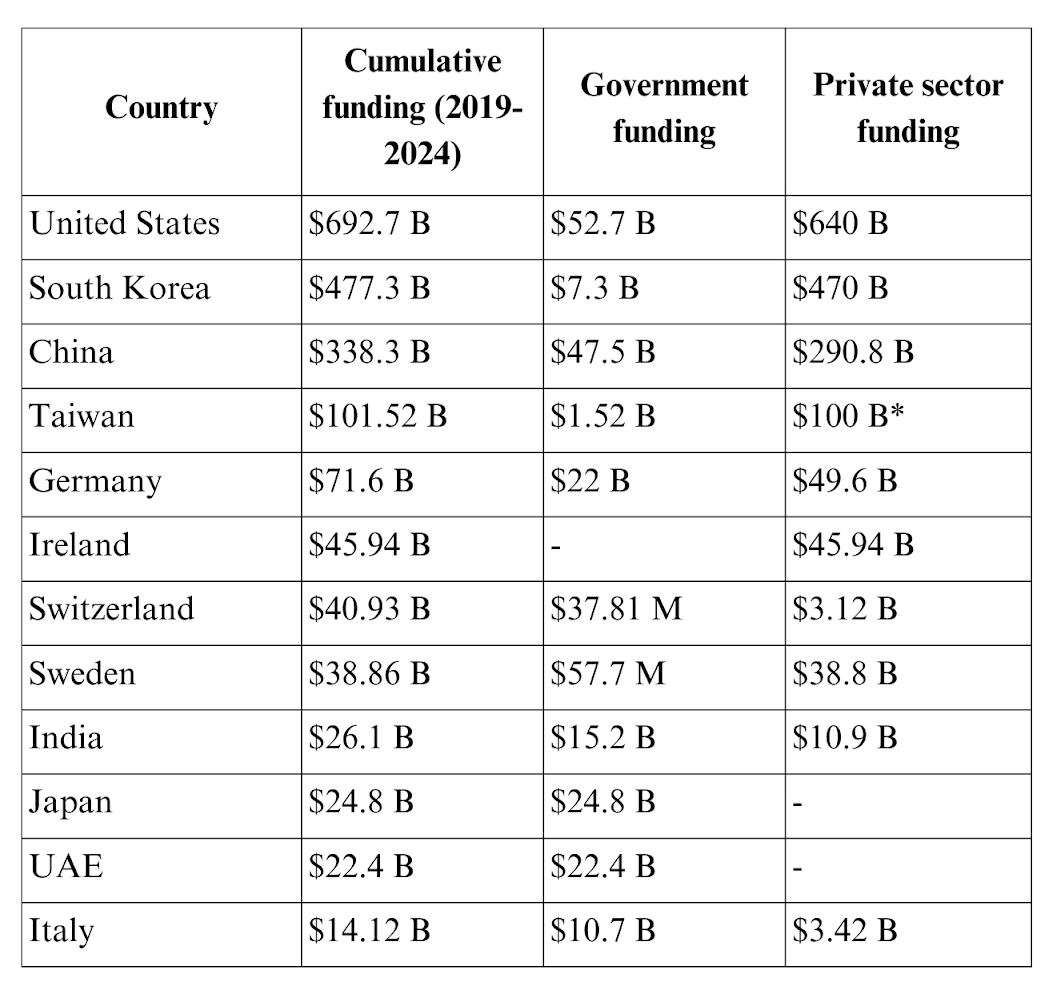In the dimly lit laboratories and bustling assembly lines of Silicon Valley, a quiet yet fierce battle rages on. The United States, once the uncontested leader in semiconductor technology, finds itself grappling to reclaim its dominance in an industry that fuels the engines of modern innovation. Our recent study at Averroes.ai paints a vivid picture of this global race, revealing a landscape where every dollar invested speaks to a nation’s quest for technological supremacy.
A glimpse at the numbers
In a recent study we conducted we sifted through over 20 data sources from 22 countries and regions, over the past five years, analyzing the financial tides that shape the semiconductor sector. The United States has poured an impressive $692.7 billion into the industry, with $52.7 billion from government coffers and a staggering $640 billion from private enterprises. Yet, this hefty investment only scratches the surface of a much larger global movement.
Cumulative Investment Values in the Semiconductor Industry by Country (Top 12)

The global contenders
South Korea has announced plans to construct the world’s largest chip center, pledging a monumental $470 billion. This ambitious project signals not just an expansion, but a bold declaration of intent to become a semiconductor powerhouse.
China, with its sprawling manufacturing base, has spent over $40 billion on chip-making equipment in 2023 alone, marking the second-highest expenditure on record since 2015.
Taiwan, holding a significant 20% share of the global semiconductor market, saw its industry valued at $115 billion in 2021. Meanwhile, India has set its sights on the future with a $15.2 billion investment approved for semiconductor and electronics production.
Strategic moves behind the numbers
Investments reflect a strategic acknowledgment of the semiconductor industry’s pivotal role in national security and technological advancement.
Italy is positioning itself as a microelectronics leader with a $14.12 billion investment, while Germany benefits from significant contributions by giants like TSMC, Intel, and Bosch.
France is fostering joint ventures in semiconductor manufacturing, highlighted by collaborations between STMicroelectronics and GlobalFoundries.
The American struggle and vision
As someone deeply embedded in the semiconductor manufacturing world, I’ve witnessed firsthand how the U.S. has ceded ground to China, which now boasts vast manufacturing capabilities and cost advantages.
Yet, there is hope. For the U.S. to regain its edge, it must do more than just inject capital; it needs a strategic vision and unwavering commitment to innovation.
Supporting startups is crucial. These fledgling companies often struggle due to a lack of data and resources. By providing funding and fostering partnerships between startups and large corporations, the U.S. can build a more resilient semiconductor ecosystem. Enhancing intellectual property protection and encouraging companies to relocate their design and R&D centers stateside are also critical steps.
A call for a coordinated strategy
The path to reclaiming leadership lies in fostering stronger collaboration between the government and private sector. Prioritizing advanced research, developing state-of-the-art manufacturing capabilities, and creating a robust talent pipeline are all essential.
At my company, Averroes.ai, this is why we are committed to driving innovation in semiconductor technology, but a coordinated national strategy is paramount.
The road ahead
The global semiconductor race is intensifying. The U.S. may lead for now, but competitors like China, with its large-scale manufacturing prowess, are formidable. To outpace them, the U.S. must invest in automation technologies and cutting-edge R&D, enhancing production efficiency and fostering innovation. Robust, automated manufacturing facilities and advanced research initiatives will be key.
Averroes is at the forefront, enhancing U.S. manufacturing with advanced visual inspection and process control technologies. Our contributions ensure greater automation and precision, vital for maintaining the U.S.’s global competitiveness in this high-stakes race.
In the end, the semiconductor arms race is more than just a competition—it’s a quest for the future. The U.S. must navigate this path with strategic foresight, relentless innovation, and a collaborative spirit to emerge as the ultimate leader in this critical industry.
Tareq Aljaber is the CEO, president, and founder of Averroes.ai Inc., leading the company in revolutionizing the semiconductor industry with AI-powered visual inspection and virtual metrology solutions. Tareq has a rich background with Microsoft, Adobe, Atlassian, Samsung, and Asyst Technologies. The Expert Opinion is exclusive to Broadband Breakfast.
Broadband Breakfast accepts commentary from informed observers of the broadband scene. Please send pieces to commentary@breakfast.media. The views expressed in Expert Opinion pieces do not necessarily reflect the views of Broadband Breakfast and Breakfast Media LLC.



